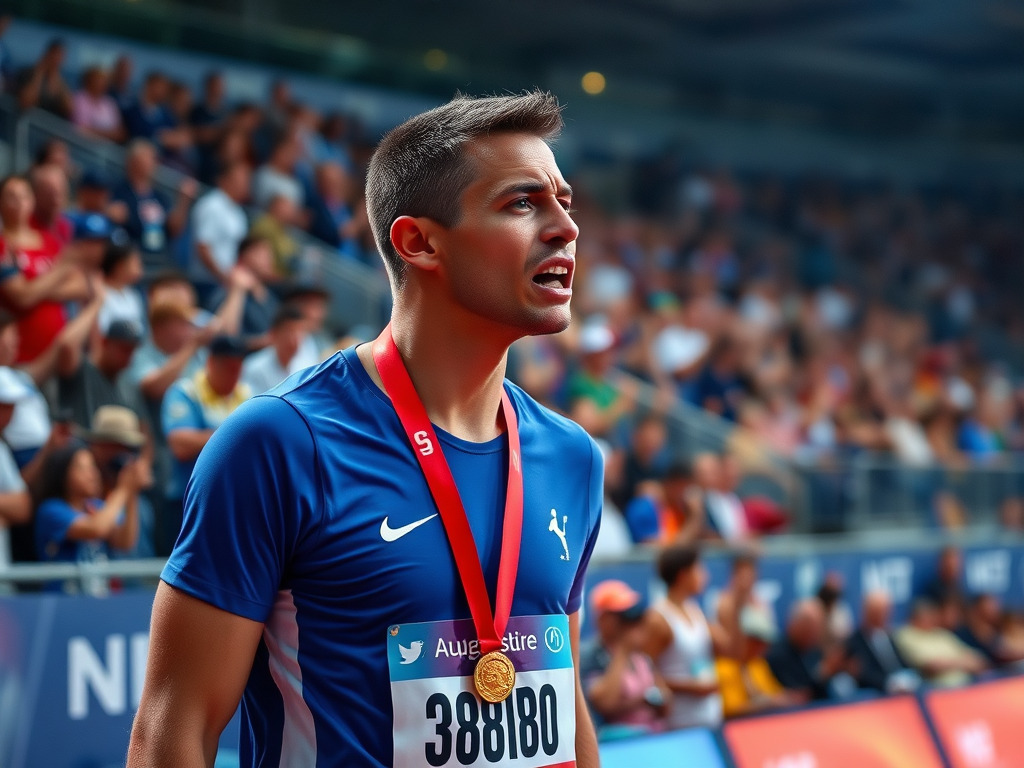INTRODUCTION
On January 26, 2025, unexpected twists marked one of the year’s most anticipated sporting events as Novak, a strong contender for gold, achieved only a second-place finish. Meanwhile, Myhlback, another top-tier athlete and key competitor, shocked fans and participants by failing to start the race despite high expectations. Novak’s strong track record in similar competitions made the silver medal a difficult outcome, leaving him visibly frustrated. He candidly admitted, “Today I lost first place,” highlighting his dissatisfaction and shaping discussions throughout the sporting world. Fans and analysts also noted that Myhlback’s mysterious absence significantly altered the race’s dynamics. The outcome’s circumstances are prompting questions about preparation, strategy, and the mental resilience needed at the highest levels of competitive sports. The event has sparked debates in Sweden about the future of its rising athletes and the overall funding for competitive sports programs.

Latest Developments
Novak’s Disappointment with Second Place
Despite his reputation as a fierce competitor, Novak couldn’t hold back his post-race frustrations. Speaking in a short interview afterward, he said, “Today I didn’t just finish second — I lost what should have been my first place.” His words revealed a raw and unfiltered disappointment that resonated with fans and competitors alike. Experts intensely analyzed Novak’s performance in the lead-up to the event, predicting a likely first-place finish based on his recent form. However, unexpected moments during the race, including external factors, seemed to disrupt him. Critics argue that Novak may have let psychological pressure affect his performance.
Myhlback’s No-Show Becomes the Talk of the Day
The strange absence of Myhlback, a promising Swedish athlete with a growing fan base, stole much of the spotlight from the race results. Leading up to the event, many experts regarded Myhlback as a serious contender, anticipating that he would directly rival Novak for the top spot. However, his failure to start left fans and commentators scrambling for explanations.
Insiders suggest health issues or last-minute logistical challenges as possible reasons for his unexpected absence, although no official statement has been released. Sport journalist Karin Lund from the Swedish Herald commented, “For Myhlback, a no-show in such a crucial event will spark conversations not only about the immediate impact but also about his long-term trajectory in the sport.”
With Myhlback out of the picture, opportunities opened up for other competitors. It’s clear that the absence of a strong rival may have unsettled Novak’s preparation, leaving him with an anticlimactic silver result by his own high standards.
Fans React to Novak’s Comments
Novak’s reaction to his silver medal garnered mixed responses across social media. Some fans sympathized with his disappointment, highlighting his competitive nature and dedication to excellence. Conversely, others criticized his lack of gratitude and sportsmanship, arguing that achieving second place remains an incredible accomplishment. One Twitter user wrote, “Novak shows us what a champion’s mentality is all about: always striving for more.” Another user countered, “Losing graciously is the true mark of a champion; a silver medal deserves respect.” The event and Novak’s remarks have sparked broader discussions on mental health in sports, the pressure of public expectations, and how athletes cope with both triumphs and setbacks.

Background and Context
Novak’s Track Record in Competitive Sports
Novak has built a reputation as one of the most consistent athletes in his discipline, with a track record that boasts several wins in both national and international arenas. In 2024, he clinched two major victories, setting the stage for this event where expectations were sky-high.
Racing up against Sweden’s best talents, Novak is often seen as a role model for younger athletes who look up to his perseverance and exceptional performance. However, his recent frustration over falling short of first place highlights the pressures elite athletes endure.
Rising Star Myhlback
Myhlback’s absence in this race only adds intrigue to his already fascinating journey in Swedish sports. A rising star with multiple accolades, Myhlback’s talent and potential to challenge established competitors have often drawn comparisons to Novak. In recent years, he has positioned himself as one of Sweden’s brightest hopes for international sporting success. His absence disappoints fans and also calls into question how external factors impact Sweden’s sports management system and athlete care programs.
Sweden’s Sporting Landscape
This event also fits into Sweden’s broader sports narrative. Sweden, known for producing talented athletes across disciplines, prides itself on its well-funded sports ecosystem. However, with cases like Myhlback’s sudden absence or Novak’s dissatisfaction with results, people have raised concerns about whether enough support is being provided to ensure athletes perform at their peak mental and physical capacities.

Future Outlook
What’s Next for Novak?
Looking ahead, Novak vowed to reassess and refine his strategy. Public focus will now shift to his next few competitions, which could either cement his reputation as a determined comeback champion or expose deeper struggles with maintaining top-tier performance. According to sports commentator Anders Pettersson, “Novak has the skills to push past this temporary setback, but his mental game will define his long-term success.”
Can Myhlback Bounce Back?
Myhlback’s absence has raised questions, but it also opens the door for his redemption. If health or personal reasons explain his absence, a carefully managed comeback could ultimately strengthen his public image. However, frequent absences could cost him sponsorship deals and the trust of fans and sports officials.
Broader Lessons for Swedish Sports
This event underscores the need for improved athlete support systems — not just physically, but also mentally and logistically. Sweden continues to cultivate future talent, and balancing high expectations with real-time athlete management may define its future on the global stage. Internationally, Sweden sets an example of how even highly efficient countries must continuously evolve their systems to address athlete well-being properly.
FAQ Section
1. Why was Novak disappointed with silver?
Novak’s frustration stems from his high expectations of clinching first place, given his strong track record and preparation. He stated that earning second place felt more like a loss of victory than an achievement, which reflects his competitive mindset but has also generated mixed reactions from the public.
2. Why didn’t Myhlback participate in the race?
Myhlback’s failure to start the race remains unexplained. Insider speculation points to health-related issues or potential logistical challenges, though no official announcement has been made. His absence shifted the dynamics of the event and allowed competitors to adjust their strategies.
3. How important is this event for Swedish sports?
Events like this exemplify the high stakes in Sweden’s sports system. It’s more than a race: it represents the country’s reputation for cultivating competitive athletes and showcases Sweden’s ability to shine on global platforms.
4. How does psychological pressure affect athletes like Novak?
Modern athletes face enormous psychological pressure, with public expectations compounded by their personal drive to succeed. Novak’s candid frustrations demonstrate the emotional toll such competitions can take despite his immense talent and preparation.
5. What changes are needed in Swedish sports management?
Swedish sports management could benefit from enhanced focus on mental health resources, improved communication with athletes, and better logistical preparations. Ensuring athlete welfare is prioritized may help avoid future absences like Myhlback’s and address challenges that hinder peak performance.
CONCLUSION
Novak’s second-place finish and Myhlback’s absence have divided fans and analysts. While public and personal expectations grapple with Novak, questions about his future confront Myhlback. The event exemplifies the unpredictable and emotionally charged nature of competitive sports. As Sweden reflects on this race, the focus shifts to lessons learned—both for athletes and their support systems. Whether Novak and Myhlback successfully manage their next challenges may shape the next chapter of Swedish sporting history. We will provide insights and updates on these developing stories.




